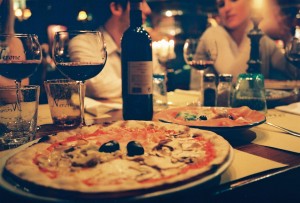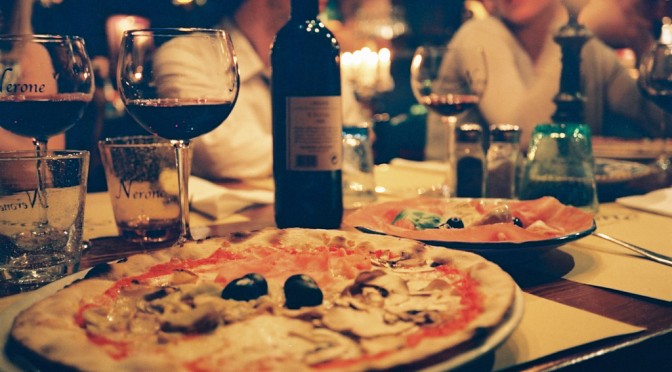One of the understood reasons why wine and alcohol in general are good complements to a meal is that it has been shown to stimulate short-term food intake. While is it is not known what exactly causes

this increase in food intake after alcohol consumption, there are several theories. First, it is possible the consumption of alcohol reduces the signals that tell the stomach that it is full. Second, alcohol consumption could trigger an increase in reward signaling of food (in other words, telling the brain that “ooo that food is really good for you!”, when in fact it may not be).
A new study published in the journal Appetite aimed to study the effect of alcohol consumption on food intake and to gain a better understanding of the mechanism behind this phenomenon.
24 healthy men were recruited for this study and were randomly assigned to consume either a vodka/orange juice mixture (20g alcohol; considered “moderate” levels) or orange juice without the alcohol. After consuming the beverage, participants were asked to either eat 40 gram piece cake or “pretend” to eat cake. Known as “modified sham feeding”, those participants asked to “pretend” to eat the cake had to put the cake in their mouths, process/chew it per the study instructions, and then spit it back out into a cup without actually swallowing any of it. Those asked to eat the cake did the same processing/chewing procedure, but actually swallowed the cake instead of spitting it out.
The food reward was determined by the amount of food ingested during a lunch 45 minutes after the alcohol/cake intervention. Foods were categorized as being high fat, low fat, savory, and sweet. Participant “liking” and “wanting” of these food categories was also recorded.
Important Findings:
- Moderate alcohol consumption increased food intake (45 minutes later) by 11%.
- Moderate alcohol consumption significantly increased “liking” of high fat and savory foods.
- Moderate alcohol consumption significantly increased “wanting” of savory foods and decreased “wanting” of sweet foods prior to the start of the meal.
- “Wanting” of low fat savory foods was higher after moderate alcohol consumption without eating cake compared to alcohol consumption plus eating cake.
- Both eating and “pretend” eating of cake did not influence the food reward (i.e. amount of food consumed at lunch) in participants.
Overall, this study suggests that moderate alcohol consumption increased food intake in healthy men, particularly foods that were considered to be high fat and savory. Taking alcohol out of the
![Photo by Flickr user [puamelia] (https://www.flickr.com/photos/ykjc9/2890513136)](http://french-paradox.net/wp-content/uploads/2015/03/alcohol-and-food-french-paradox-201x300.jpg)
While this study did not actually address the mechanism of action in regards to alcohol consumption and food intake, the results do provide further support that moderate alcohol consumption does increase the amount of food that one eats at the next meal (in this case, 45 minutes later), and that high fat and savory foods are desired significantly more often than other food types.
Source:

